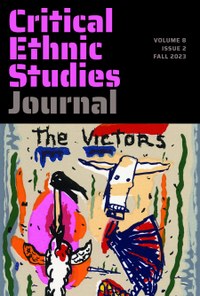Critical Ethnic Studies
Critical Ethnic Studies Association

Critical Ethnic Studies explores the guiding question of the Critical Ethnic Studies Association: how do the histories of colonialism and conquest, racial chattel slavery, and white supremacist patriarchies and heteronormativities affect, inspire, and unsettle scholarship and activism in the present? By decentering the nation-state as a unit of inquiry, focusing on scholarship that expands the identity rhetoric of ethnic studies, engaging in productive dialogue with indigenous studies, and making critical studies of gender and sexuality guiding intellectual forces, this journal appeals to scholars interested in the methodologies, philosophies, and discoveries of this new intellectual formation.
Critical Ethnic Studies is now open access. Read the latest issue on Manifold.
Website: http://www.criticalethnicstudiesjournal.org/